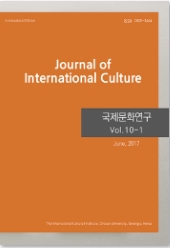浅析影响韩中翻译的因素
A Brief Analysis on Factors that Affects Korean-Chinese Translation
- 조선대학교 국제문화연구원
- 국제문화연구
- Vol.9 No.1
-
2016.0655 - 63 (9 pages)
- 39

Translation, as an inter--cultural communication activity, is affected by different factors. This article analyzes the effect of such factors on Korean-Chinese translation from cultural, grammatical and translator s personal aspects. Looking from the cultural perspective, China and Korean both belong to East Asian culture. The two nations have been having an active relationship. A lot of cultural aspects are shared but meanwhile distinctive cultural factors exist. During translation, the distinctive factors need special attention. As languages, Chinese and Korean are absolutely different; one is an isolation language, while the other one is an agglutinative language. Furthermore, two languages have different grammatical orders. In Chinese, the grammatical order is subject followed by verb then object. But in Korean, the order is subject flowered by object then verb. During translation, we must pay attention to these grammatical factors to avoid mistakes. When the translator s personal aspects are concerned, the writer believes as subjective factors, the translator s way of thinking, Korean and Chinese language proficiencies, level of understanding etc, all directly affect the translation standards. Translation is a profound and independent branch of knowledge. During the process, it requires the translator to have sound theoretical knowledge, constantly improve language proficiencies in Chinese and Korean, understand the local customs and manners of both nations, and at the same time, advance his skills through continuous practice.
Abstract
Ⅰ. 绪论
Ⅱ. 文化因素
Ⅲ. 语法因素
Ⅳ. 译者个人因素
Ⅴ. 结论
参考文献
(0)
(0)